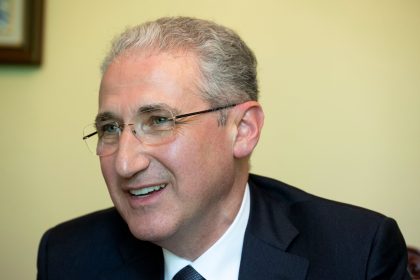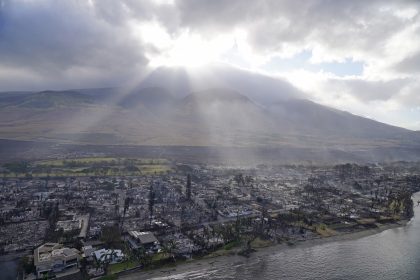Greenhouse Gases Heat Up Lawmakers’ Health Concerns

WASHINGTON — The million acres of forest that burned in western states in the past week were a lesser concern for a congressional panel that discussed the hazards of high heat caused by climate change Wednesday.
“It’s becoming a routine part of life on the West Coast,” Rep. Anthony Gonzalez, R-Ohio, said about the forest fires.
Instead, the House Science, Space and Technology subcommittee on the environment discussed how deadly high heat was becoming.
“As extreme heat ramps up in the U.S., so too will heat-related illnesses and deaths,” said Rep. Mikie Sherrill, D-N.J., chairwoman of the subcommittee on the environment. “Extreme heat is the deadliest natural disaster, killing more people than floods, tornadoes and other extreme weather events combined.”
Officially, the Centers for Disease Control and Prevention reports that heat kills about 600 Americans a year. Sherrill and other lawmakers said the official report is an undercount.
“The number may be as high as 12,000 heat-related deaths in the U.S., with communities of color and low-income communities most at risk,” Sherrill said.
Typically, the deaths result from heat stress that stops beating hearts, particularly among the elderly and very young. In addition, heat can aggravate pre-existing health problems, which masks the real cause of death.
Other heat-related deaths have been tied to an accelerated growth rate for harmful bacteria that gets into drinking water.
Longevity in the United States has been increasing in recent decades. In states hit hardest by global warming, “There’s evidence that mortality trends are reversing,” said Aaron Bernstein, director of Harvard University’s Center for Climate, Health and the Global Environment.
Bernstein, who also is a pediatrician, said he’s seen evidence high heat can stunt the growth of fetuses.
Congress is in the early stages of figuring out what they can do about it.
One proposal, called the Preventing Heat Illness and Deaths Act, would establish a “National Integrated Heat Health Information System Interagency Committee” to focus on reducing the health risks of extreme heat.
The committee would be charged with developing a strategic plan to coordinate federal efforts and study how extreme heat affects health. It also would administer matching grants to increase awareness of heat risks and to develop projects — such as urban forestry — to make communities more resilient to the risks.
The National Oceanic and Atmospheric Administration would lead development of the program.
The Preventing Heat Illness and Deaths Act has been introduced in the Senate but not yet reached a vote.
The congressional hearing was prompted in part by a heat dome that raised temperatures in Pacific Northwest states to record levels. A meteorological study found the temperatures could be explained only as a result of rising greenhouse gas levels.
“Temperatures reached 40 degrees above average in some places, causing pavement to buckle, streetcar cables to melt and at least 193 deaths across the region,” said Sherrill, the subcommittee chairwoman.
The heat dome is a ridge of high pressure lodged in the jet stream, not allowing air to move. Record temperatures of 115-degrees were reported in both Oregon and Washington state in late June.
Temperatures in Lytton, British Columbia, hit 116 degrees, breaking Canada’s all-time record high by three degrees.
In Oregon, the governor directed state Occupational Health and Safety officials to enforce temporary rules to protect workers from extreme heat. The new rules expand requirements for employers to offer their workers shade, rest and cool water.
No member of the subcommittee on the environment hinted at a belief climate change will ease soon as scientists report rising greenhouse gas levels and temperatures.
“I believe we’re about to embark on a deadlier summer,” said Rep. Eddie Bernice Johnson, D-Texas.

























